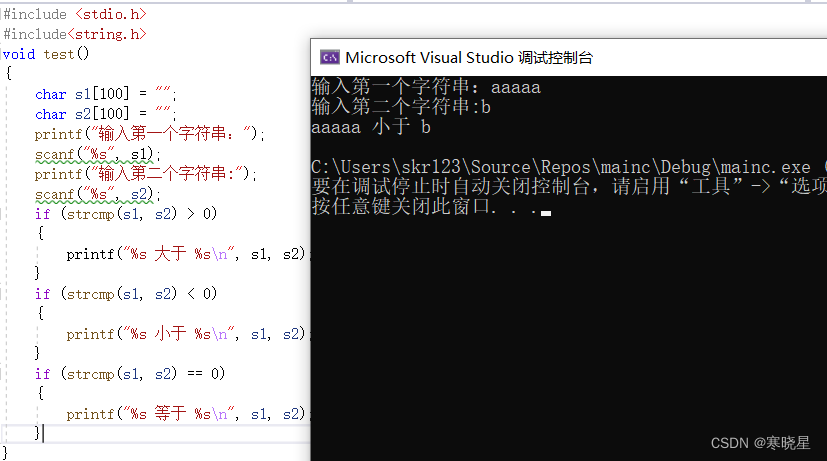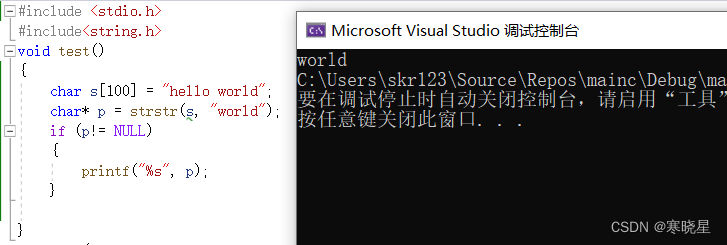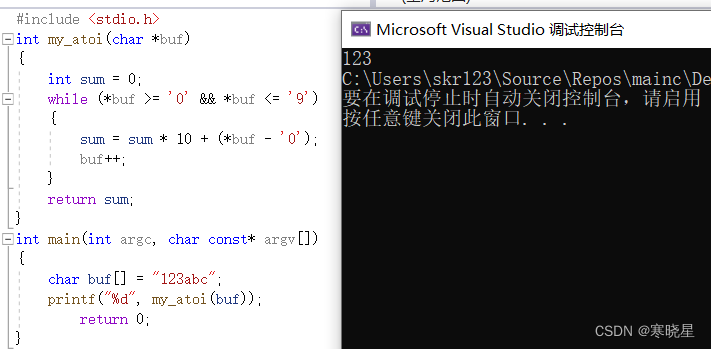Table of contents
1. String processing functions
1. Measure the length of the string strlen
2. String copy function strcpy/strncpy (copy the first n characters)
3. String append function strcat/strncat
4. String comparison function strcmp
5. Character lookup function strchr/strrchr
7. String replacement function memset
1. String processing functions
The functions starting with str are all string operation functions, and all of them encounter '\0' to end the operation
Header file: #include<string.h>
1. Measure the length of the string str len
Usage: size_t strlen(const char *s);//const read-only
s is the address of the first element of the string to be measured , '\0' will not be measured
Example:
char str[100]="hello world";
strlen(str) == 11;
2. String copy function strcpy/strncpy (copy the first n characters)
Copy the string pointed to by src to the memory pointed to by the dest pointer, and copy when encountering '\0' , and the return value is the address of the destination memory.
Usage: char *strcpy(char *dest, const char *src);
char *strncpy(char *dest, const char *src, size_t n);
dest: destination space address
src: the address of the first element of the original string
Example:

3. String append function strcat/strncat
Usage: char *strcat(char *dest, const char *src);
char *strncat(char *dest, const char *src, size_t n);
Append the string pointed to by src to the end of the string pointed to by dest
Example:

4. String comparison function strcmp
Usage: int strcmp(const char *s1, const char *s2);
int strncmp(const char *s1, const char *s2, size_t n);
Compare character ASCII code values one by one.
return value:
>0 string s1 > string s2
<0 string s1 < string s2
==0 String s1 == String s2
Example:

5. Character lookup function strchr/strrchr
Usage: char *strchr(const char *s, int c);//check from front to back
char *strrchr(const char *s, int c);//check from back to front
The return value of strchr is to find the address of the first occurrence of character c from front to back , if not found , it returns NULL

6. String search strstr
用法:char *strstr(const char *haystack, const char *needle);
Return value : Found to return the found address failed to return NULL

7. String replacement function memset
用法:void *memset(void *str, int c, size_t n)
Copies the character c (an unsigned char) to the first n characters of the string pointed to by the parameter str .
The value returns a pointer to the memory area str .
Case: replace world with $$$$$

8. String cutting strtok
用法:char *strtok(char *str, const char * delim);
The first cut: str must point to the address of the first element of the string to be cut , delim points to the separator "|"
Subsequent cutting: str passes NULL delim to point to the separator "|"
Return value: success : the address of the first element of the return value substring
Failure : return NULL
Cutting method 1:
#include <stdio.h>
#include<string.h>
void test()
{
char str[] = "aaaa|bbbb|cccc|dddd";
int i = 0;
char *buf[30];//存放字串首元素地址
buf[i]=strtok(str, "|");//第一次存
while (buf[i] != NULL)
{
i++;
buf[i] = strtok(NULL, "|");//后续存
}
//遍历切割完后的字串
for (int j = 0; j < i; i++)
{
printf("%s\n", buf[i]);
}
}
Cutting method 2:
char str[] = "aaaa|bbbb|cccc|dddd";
int i = 0;
//buf[0] = str
char* buf[30] = {str};//存放子串首元素地址
//后续切
int i = 0;
while (1)
{
buf[i] = strtok(str[i], "|");
if (buf[i] == NULL)
break;
i++;
}Simplified cutting method:
char str[] = "aaaa|bbbb|cccc|dddd";
//buf[0] = str
char* buf[30] = {str};//存放子串首元素地址
//后续切
int i = 0;
while ((buf[i] = strtok(buf[i], "|")) && (++i));2. String conversion value
1. Function realization
Header file: #include<stdlib.h>
atoi converts numeric strings to int types
atol converts numeric strings to long types
atof converts a numeric string to a float type

